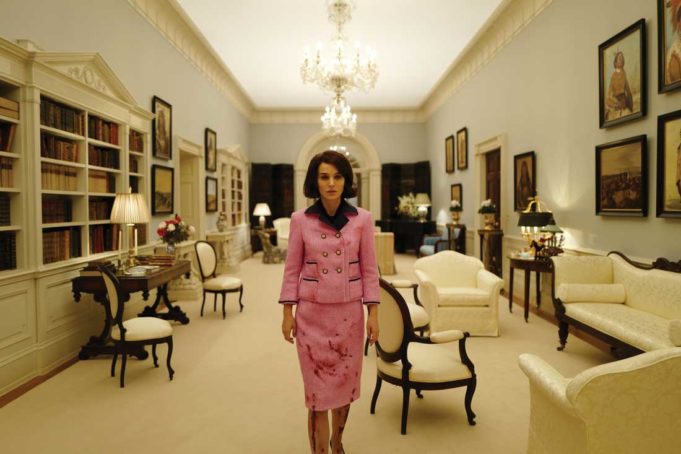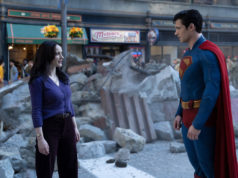As with any subject that has been plumbed endlessly by journalists and historians as well as artists, a movie about the Kennedys needs a fresh angle. Jackie finds one, concentrating on the first lady and her careful management of the family’s historical legacy in the immediate aftermath of her husband’s assassination. The unusual structure of this movie gives it a fantastical, free-associative feel that holds together and distinguishes it from the sort of conventional Hollywood biopic that many directors would have made. It’s all done with so much skill, and yet it left me with more to admire than to like.
Natalie Portman stars in this, and the bulk of the action takes place in Washington after the assassination as Jackie Kennedy oversees the funeral arrangements and stickier related matters like moving out of the White House. This is intercut with two other incidents, so closely that it’s hard to tell which is a framing device. One is the filming of A Tour of the White House with Mrs. John F. Kennedy, a 1962 TV documentary spotlighting her work redecorating the residence and preserving its history. The other is an exclusive interview she gives to an unnamed journalist (Billy Crudup) while holed up at Hyannis Port a week after the assassination, in which she plants the seed of the mythology of the Kennedy White House as Camelot.
This is likely your first look at a movie directed by Pablo Larraín, who helmed some stunning films in his native Chile prior to this, including the Oscar-nominated No. This is his first movie in English and his first one about a woman, but otherwise it’s strangely cut from the same cloth as his Chilean films. One common thread running through his work is how all of us project the image of ourselves to the world that we need to, whether we’re Chile’s greatest poet (the upcoming Neruda) or a serial killer obsessed with winning a John Travolta lookalike contest (Tony Manero). He and screenwriter Noah Oppenheim carefully track how Jackie, amid her grief, keeps one eye on how the American public expects her to behave and knows how her behavior will play to the ever-present cameras — when Lady Bird Johnson (Beth Grant) offers Jackie a chance to change out of her blood-stained pink outfit, she replies in a low, determined voice, “Let them see what they’ve done.” Larraín embraces the plush atmosphere of 1960s Washington and contrasts it with a great, dissonant string score by Mica Levi, the best thing here.
For all this, the movie’s impact is more intellectual than emotional. I think the reason for this is Portman. This movie gives her the staple scenes of a star vehicle, as we see Jackie exploding at Robert Kennedy (Peter Sarsgaard) for making funeral decisions without her consent, getting hammered on vodka and trying on various evening gowns while listening to the Camelot soundtrack, and walking in heels across a rain-soaked Arlington National Cemetery to her husband’s future burial place as if irresistibly pulled to the spot. She does all this willingly and with aplomb, and does a fair impression of Jacqueline Kennedy’s breathy, refined upper-class accent. For all that, this hard-working actress can’t help but show us the hard work, to the point where it obscures everything else. Her neuroticism and control-at-all-costs mindset served her magnificently in Black Swan, and it’s appropriate here as well, but she remains distant and atonal in a movie that wants her Jackie to be a tragic heroine who represses parts of herself to be mother to a reeling nation. Her graveyard conversation with an old Catholic priest (John Hurt) would have been better left out, too.
While Larraín’s films are often funny, he leaves the jokes at home, probably correctly feeling they’d be out of place here. Instead, he makes good use of the tension between the dignified widow persona that Jackie shows to the public and the messy private feelings that lead her to order a public funeral procession over the Secret Service’s objections. It’s all probing and enlightening and lived-in. I just walked out of it unmoved.












